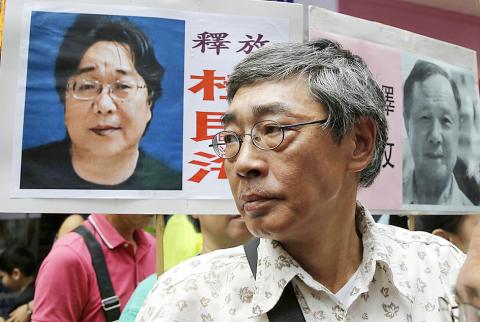Human rights campaigners yesterday slammed as “appalling” the disappearance of dissident publisher Gui Minhai (桂民海) after his daughter said he had been snatched again in China, the latest person ensnared in Beijing’s crackdown on civil society.
Rights have come under increasing pressure since Chinese President Xi Jinping (習近平) took power in 2012, with widespread arrests of lawyers and activists.
Gui, a Swedish citizen, was one of five Hong Kong-based booksellers known for salacious titles about the lives of China’s political elite who went missing in 2015 and resurfaced in detention on the mainland.

Photo: AP
Chinese authorities said they had released Gui in October, but it was unclear to what extent he was a free man.
His daughter, Angela Gui, told Radio Sweden that since her father’s official release from detention, he had been put in a police-managed apartment under surveillance.
She said that he was then snatched by plainclothes police on Saturday while on a train to Beijing from Ningbo, where he was living, while accompanied by two Swedish diplomats.
Her father had been traveling to Beijing to see a Swedish doctor as he was showing symptoms of the neurological disease amyotrophic lateral sclerosis, she said.
“At one of the stops before Beijing there were about 10 men in plain clothes that came in and said they were from the police and just grabbed him and just took him away and after that I have not heard anything,” she told Radio Sweden.
The New York Times also reported that Gui had been taken in the presence of two Swedish diplomats.
The Swedish Ministry of Foreign Affairs said it was “fully aware” of what had happened to Gui.
Ministry spokesman Patric Nilsson said that “forceful measures have been taken at a high political level.”
Swedish Minister of Foreign Affairs Margot Wallstrom had summoned China’s ambassador to a meeting and had been promised information about what happened to the publisher, Nilsson added.
During a regular press briefing, reporters asked Chinese Ministry of Foreign Affairs spokeswoman Hua Chunying (華春瑩) about the incident, but she declined to directly address the case, saying she was “not aware of the details” and that the issue was out of the agency’s “remit.”
However, she added that “any foreigner must observe Chinese laws and regulations. This is common sense.”
Rights group Amnesty International described the incident as “absolutely appalling” and called for Gui to be released and allowed to seek medical treatment.
The fact that he was snatched in front of diplomats should be a “wake-up call” to the international community, Amnesty’s China researcher William Nee (倪偉平) said.
Literary society and activist group PEN Hong Kong expressed “highest concern” over Gui’s latest disappearance.

Nvidia Corp yesterday unveiled its new high-speed interconnect technology, NVLink Fusion, with Taiwanese application-specific IC (ASIC) designers Alchip Technologies Ltd (世芯) and MediaTek Inc (聯發科) among the first to adopt the technology to help build semi-custom artificial intelligence (AI) infrastructure for hyperscalers. Nvidia has opened its technology to outside users, as hyperscalers and cloud service providers are building their own cost-effective AI chips, or accelerators, used in AI servers by leveraging ASIC firms’ designing capabilities to reduce their dependence on Nvidia. Previously, NVLink technology was only available for Nvidia’s own AI platform. “NVLink Fusion opens Nvidia’s AI platform and rich ecosystem for

‘WORLD’S LOSS’: Taiwan’s exclusion robs the world of the benefits it could get from one of the foremost practitioners of disease prevention and public health, Minister Chiu said Taiwan should be allowed to join the World Health Assembly (WHA) as an irreplaceable contributor to global health and disease prevention efforts, Minister of Foreign Affairs Lin Chia-lung (林佳龍) said yesterday. He made the comment at a news conference in Taipei, hours before a Taiwanese delegation was to depart for Geneva, Switzerland, seeking to meet with foreign representatives for a bilateral meeting on the sidelines of the WHA, the WHO’s annual decisionmaking meeting, which would be held from Monday next week to May 27. As of yesterday, Taiwan had yet to receive an invitation. Taiwan has much to offer to the international community’s

CAUSE AND EFFECT: China’s policies prompted the US to increase its presence in the Indo-Pacific, and Beijing should consider if this outcome is in its best interests, Lai said China has been escalating its military and political pressure on Taiwan for many years, but should reflect on this strategy and think about what is really in its best interest, President William Lai (賴清德) said. Lai made the remark in a YouTube interview with Mindi World News that was broadcast on Saturday, ahead of the first anniversary of his presidential inauguration tomorrow. The US has clearly stated that China is its biggest challenge and threat, with US President Donald Trump and US Secretary of Defense Pete Hegseth repeatedly saying that the US should increase its forces in the Indo-Pacific region

ALL TOGETHER: Only by including Taiwan can the WHA fully exemplify its commitment to ‘One World for Health,’ the representative offices of eight nations in Taiwan said The representative offices in Taiwan of eight nations yesterday issued a joint statement reiterating their support for Taiwan’s meaningful engagement with the WHO and for Taipei’s participation as an observer at the World Health Assembly (WHA). The joint statement came as Taiwan has not received an invitation to this year’s WHA, which started yesterday and runs until Tuesday next week. This year’s meeting of the decisionmaking body of the WHO in Geneva, Switzerland, would be the ninth consecutive year Taiwan has been excluded. The eight offices, which reaffirmed their support for Taiwan, are the British Office Taipei, the Australian Office Taipei, the